|
|
|
Sort Order |
|
|
|
Items / Page
|
|
|
|
|
|
|
| Srl | Item |
| 1 |
ID:
091410
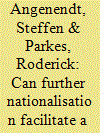

|
|
|
|
|
| Publication |
2009.
|
| Summary/Abstract |
The European Council's 2008 'Immigration Pact' has been touted by its main protagonist, the French government, as a turning point in EU migration policymaking. In one respect at least, the French are not exaggerating. The Pact represents a challenge to a key assumption underpinning European integration, namely that communitarised policymaking procedures are the best means of achieving truly common policies: Paris presented the intergovernmental Pact as a means of succeeding where communitarised decision-making has failed - in achieving the goal of a coherent common migration policy. However, analysis shows the French claims to be largely unfounded: although the European Council might theoretically have played a useful role here, in practice its efforts will add little to the achievement of a truly common policy.
|
|
|
|
|
|
|
|
|
|
|
|
|
|
|
|
| 2 |
ID:
188578
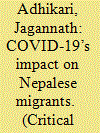

|
|
|
|
|
| Summary/Abstract |
This article examines how COVID-19 has impacted Nepalese migrants’ vulnerability and the actions they have taken to adapt to the situation. It investigates the problems created by COVID-19 from a disaster-risk management approach, the preparatory measures taken to deal with the disaster, and efforts by state and non-state actors in migrants’ rescue, relief, and reintegration into society. Marginal migrants, including unskilled workers, women, undocumented individuals, have been most affected by the pandemic, something which was also overlooked by government policies. The study shows that because government subsidies for migrants were too meagre and came too late, migrants have started going back abroad, despite COVID-19 risks. Furthermore, the study reveals that Nepalese migrants’ vulnerability depends on their levels of education, skills, gender, and legal status. In the light of these findings, the Nepal government needs a stronger institutional structure to help migrants navigate transnational spaces.
|
|
|
|
|
|
|
|
|
|
|
|
|
|
|
|
| 3 |
ID:
142632


|
|
|
|
|
| Summary/Abstract |
In order to address skill shortages and the demographic challenges facing the EU, member states have to attract (and retain) the more skilled migrants. Nevertheless, foreign residents generally find a significant wage gap with respect to native-born workers when arriving in a host country. Favourable integration policies seem to improve the relative performance of immigrants in the labour market. Indeed, analysis of the role of favourable or unfavourable policies in supporting labour market mobility of recently arrived immigrants shows that wage discrimination between immigrants and natives is lower in those countries with more favourable policies and that this lower gap is associated with higher returns on experience and schooling.
|
|
|
|
|
|
|
|
|
|
|
|
|
|
|
|
| 4 |
ID:
186189


|
|
|
|
|
| Summary/Abstract |
Little theoretical or empirical work examines migration policy in the developing world. We develop and test a theory that distinguishes the drivers of policy reform and factors influencing the direction of reform. We introduce an original data set of de jure asylum and refugee policies covering more than ninety developing countries that are presently excluded from existing indices of migration policy. Examining descriptive trends in the data, we find that unlike in the global North, forced displacement policies in the global South have become more liberal over time. Empirically, we test the determinants of asylum policymaking, bolstering our quantitative results with qualitative evidence from interviews in Uganda. A number of key findings emerge. Intense, proximate civil wars are the primary impetus for asylum policy change in the global South. Liberalizing changes are made by regimes led by political elites whose ethnic kin confront discrimination or violence in neighboring countries. There is no generalizable evidence that developing countries liberalize asylum policy in exchange for economic assistance from Western actors. Distinct frameworks are needed to understand migration policymaking in developing versus developed countries.
|
|
|
|
|
|
|
|
|
|
|
|
|
|
|
|
| 5 |
ID:
146477
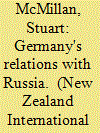

|
|
|
| 6 |
ID:
128183
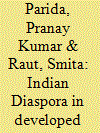

|
|
|
|
|
| Publication |
2014.
|
| Summary/Abstract |
The Indian Diaspora is a genetic term to describe the people who migrated from territories that are currently within the border of the Republic of India. It also refers to their descendants. The Diaspora is currently estimated to number over twenty million composed of NRI-Indian citizens not residing in India and PIO-persons of Indian Origin who have acquired the citizenship of some of other country. The Diaspora covers practically every part of the world.
|
|
|
|
|
|
|
|
|
|
|
|
|
|
|
|
| 7 |
ID:
125002
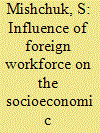

|
|
|
|
|
| Publication |
2013.
|
| Summary/Abstract |
The article analyzes the dynamics of the drawing of foreign workforce to the Far East of Russia from the mid-19th to the beginning of the 21st centuries. It cites results of comparative analysis of quantitative and qualitative indices of the labor migrants' influence on the socioeconomic development of the territory under examination during the pre-Soviet, Soviet and post-Soviet periods. The author characterizes the reasons for drawing foreign workers from the adjacent Asian countries to the Russian Far East and their role in its development.
|
|
|
|
|
|
|
|
|
|
|
|
|
|
|
|
| 8 |
ID:
131841


|
|
|
|
|
| Publication |
2014.
|
| Summary/Abstract |
IT IS DIFFICULT to define the exact moment when in Europe there was a soft click of a switch and the "Belavezha Accords" were launched, which slowly but logically brought the European Union before our eyes. However, distinctly visible cracks appeared long before the financial crisis, which clearly polarized the interests of the "periphery" and the center, the new and old members of the club.
Today, sharp differences have come to light in the infighting between the founding fathers themselves, dissatisfied with Brussels and each other's policies. This applies to such fundamental issues as competition in the domestic markets, the distribution of benefits and credits, and migration policy.
|
|
|
|
|
|
|
|
|
|
|
|
|
|
|
|
| 9 |
ID:
134339
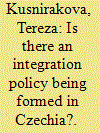

|
|
|
|
|
| Summary/Abstract |
This article critically reviews the development of Czech immigration and integration policy with special emphasis on that part of migration policy that Czechia implements relatively independently of the EU. The main objective, then, is to shed light on factors that have influenced immigration and integration policy formation. The key question of whether integration policy is being formed in Czechia and what direction Czechia is taking is answered in the following steps: description of migration policy including the role of the EU, discussion of the influence of the apolitical nature of the migration policy and analysis of the influence of alien and security discourse on the integration of immigrants into Czech society.
|
|
|
|
|
|
|
|
|
|
|
|
|
|
|
|
| 10 |
ID:
157502
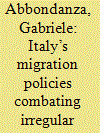

|
|
|
|
|
| Summary/Abstract |
Italian migration policies combating irregular immigration from the early 20th century to the present times have been increasingly debated and controversial. Four phases are detectable: the absence of a legal framework while Italy was still an emigration country, the first regulations of the 1980s, policies influenced by both the European integration process and the increase in immigration until 2002 and, lastly, the country’s controversial approaches since 2004. What is noticeable is a dichotomy in Italy’s migration policies, with generally consistent internal measures and often contrasting external ones.
|
|
|
|
|
|
|
|
|
|
|
|
|
|
|
|
| 11 |
ID:
180281


|
|
|
|
|
| Summary/Abstract |
The European Union (EU)–Turkey deal consolidated a shift in the EU’s migration policy. The deal is the culmination of the dominance of the security frame and depicts the continuous externalization of the EU’s responsibility of asylum protection and burden sharing. The strengthening of the security frame has weakened the humanitarian norms that previously dictated EU’s behaviour. This has led to the EU losing some of its comparative advantages in negotiations. Simultaneously, the instrumentalization of the value of asylum, paired with an increased number of asylum seekers, has given negotiation leverage to the neighbouring countries turned service providers. These changes in perception and norms have created a power shift, at the disadvantage of the EU, creating a more leveled playing field for negotiations between the parties. This article tracks the historical shifts in the global refugee regime to explain how today’s situation was created. Hereby, the existence of two competing cognitive frames—humanitarian and security—is assumed, tracked and analysed. While looking at the EU–Turkey deal, the article shows that the EU has started treating refugees as a security problem rather than a humanitarian issue, breaking the normative fabric of the refugee regime in the process. The article also displays how Turkey was able to capitalise on this new reality and engage with negotiations of other neighbouring countries of EU that point towards a change of dynamics in the global refugee regime.
|
|
|
|
|
|
|
|
|
|
|
|
|
|
|
|
| 12 |
ID:
120571
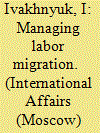

|
|
|
|
|
| Publication |
2013.
|
| Summary/Abstract |
INTERNATIONAL LABOR MIGRATION is the quintessence of the inherent challenges of globalization, embodying the contradiction between the interests of states receiving migrants and those of the states of their origin. The search for compromise international mechanisms to streamline the flows of labor migration and maximize the potential inherent in it lies at the base of the debate on migration, the intensity of which has increased in conditions of the global economic crisis. International organizations insist that the observance of human rights is the only possible approach to the formation of an international system of labor migration management. How realizable in the contemporary world is the idea of human rights as the basis of inter-state cooperation on labor migration and how does it get modified under the influence of the increasing migration interdependence of states?
|
|
|
|
|
|
|
|
|
|
|
|
|
|
|
|
| 13 |
ID:
179110
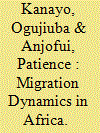

|
|
|
|
|
| Summary/Abstract |
International migration has continued to increase over the years. As people relocate to seek opportunities, their hopes and aspirations for a better life become a driving force. The extent to which their expectations are achieved is not documented in South Africa. This paper examines the expectations versus experiences of international immigrants in South Africa using Cameroonian and Democratic Republic of Congo immigrants residing in Cape Town. A qualitative approach with snowball sampling selected key informants from Cameroonian and Congolese nationalities in Cape Town. Results suggest that most immigrants did not meet their expectations for migrating, due to migration policy limitations of the host country exempting them from opportunities. The results align with both the Capability Approach theory and Lee’s model of migration. Most of the immigrants showed despondency but do not prefer the option of returning to their home country. This is because they have not attained their goals for migration. The paper recommends that policy discussion between the South African government and stakeholders has become imperative to obtain an informed perspective on the dynamics of migration.
|
|
|
|
|
|
|
|
|
|
|
|
|
|
|
|
| 14 |
ID:
101529
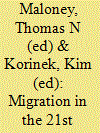

|
|
|
|
|
| Publication |
London, Routledge, 2011.
|
| Description |
xv, 288p.
|
| Standard Number |
9780415779142, hbk
|
|
|
|
|
|
|
|
|
|
|
|
Copies: C:1/I:0,R:0,Q:0
Circulation
| Accession# | Call# | Current Location | Status | Policy | Location |
| 055574 | 325.73/MAL 055574 | Main | On Shelf | General | |
|
|
|
|
| 15 |
ID:
156753


|
|
|
|
|
| Summary/Abstract |
There has been an increasing focus on migration management by academics and policy makers, especially in relation to temporary and transitional forms of mobility. This paper considers the acceleration of Filipino migration to New Zealand in recent years, partly driven by changing policies allowing migrants to transition from student and work visas to permanent residence. It outlines the history of Filipino migration to New Zealand, the roles of the Philippines and New Zealand governments and intermediaries in migration management and the nature of student, temporary work and permanent residence migration. The transitional pathways used by Filipino migrants are analysed in relation to the influence of skills and educational characteristics in creating opportunities for some and vulnerability for others.
|
|
|
|
|
|
|
|
|
|
|
|
|
|
|
|
| 16 |
ID:
131796
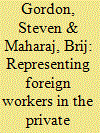

|
|
|
|
|
| Publication |
2014.
|
| Summary/Abstract |
In recent years South African cities have become home to a large number of undocumented migrant workers. If trade unions do not organise undocumented migrant workers, it opens up such workers to exploitation and maltreatment by employers, thereby creating a split labour market that undermines the entire labour movement. This article focuses on the responses of the national trade union movement in the private security sector to the presence of undocumented workers at the grassroots level. Using a case study approach, we find that the pressures of labour market informalisation in the industry prompt unions to seek to maintain and advance their position from their traditional support base of citizen workers rather than attempt to include new groups. The failure to engage is reinforced by anti-immigrant attitudes which link foreigners with problems in the industry such as low wages and portrays such workers as co-conspirators rather than comrades. While justice and solidarity have always been the foundation of trade unionism in South Africa, the movement is in danger of failing this test if the current situation in terms of the exclusion of undocumented foreign workers persists.
|
|
|
|
|
|
|
|
|
|
|
|
|
|
|
|
| 17 |
ID:
130912
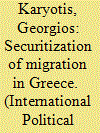

|
|
|
|
|
| Publication |
2012.
|
| Summary/Abstract |
The field of security is largely controlled by elites who, by virtue of their authority, are able to create an image of an enemy which is largely independent of the objective significance of a threat. However, a narrow focus on speech acts and discourse analysis to study such processes of securitization is inherently inadequate. This article provides a panoramic account of Greek migration politics during the 1990s. It shows that securitization can be discursive or nondiscursive, pre-mediated or subconscious, and beneficial or detrimental for securitizing actors. Elite interviews and an in-depth analysis of contextual factors help make sense of these dynamics
|
|
|
|
|
|
|
|
|
|
|
|
|
|
|
|
| 18 |
ID:
132509
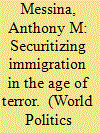

|
|
|
|
|
| Publication |
2014.
|
| Summary/Abstract |
In the context of the evidence presented in both the collected scholarship under review and other select works, this article asks if and to what extent migration-related issues have been securitized in Europe and the United States. In addressing these questions it executes three tasks. First, it critically assesses the four major dimensions across which contemporary immigration purportedly is securitized: on one side, rhetorically addressing immigration-related issues through political elite discourse, public opinion, and the mass media; and on the other, the policy processes through which immigration is securitized. Second, this article identifies the strengths and weaknesses of securitization theory as it has been applied to immigration. Finally, it draws mostly negative conclusions about the veracity of the central claims of the securitization of immigration literature and, specifically, its causal story.
|
|
|
|
|
|
|
|
|
|
|
|
|
|
|
|
| 19 |
ID:
180569
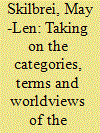

|
|
|
|
|
| Summary/Abstract |
Researchers have many incentives to make sure that the work they do is relevant to policymakers and implementers. First, it may secure them funding; second, ‘impact’ is part and parcel of academic evaluations; and third, researchers are often attracted by the prospect of doing work that matters and that contributes towards social justice. Moreover, the mandate and urge to be relevant are central to governments’ capacity to formulate effective and just policies, but this may also constitute an epistemological challenge by creating blind spots. In this article, I explore key challenges that emerge from the relationship between policy and research. I take as a starting point my own experiences as a migration scholar, who mainly conducts research on migration to Norway and the development and implementation of Norwegian migration policies, and use these to reflect on the consequences of external and internal pressures on research to be relevant and have an impact.
|
|
|
|
|
|
|
|
|
|
|
|
|
|
|
|
| 20 |
ID:
192042


|
|
|
|
|
| Summary/Abstract |
What is the causal impact of terrorism on immigration policy preferences? Under what circumstances and due to which psychological micro-mechanisms does this impact materialize? To answer these questions, we provide evidence from pre-registered and well-powered experiments for Germany and the United Kingdom. We find that anti-immigration responses to terrorism follow an emotional proximity rationale: terrorism leads to more restrictive migration policy preferences only among individuals with high levels of perceived insecurity, especially when terrorism occurs in their own country. Policy preferences are not affected by terrorism abroad or by information cues on the objectively low probability of being victimized.
|
|
|
|
|
|
|
|
|
|
|
|
|
|
|
|
|
|
|
|
|